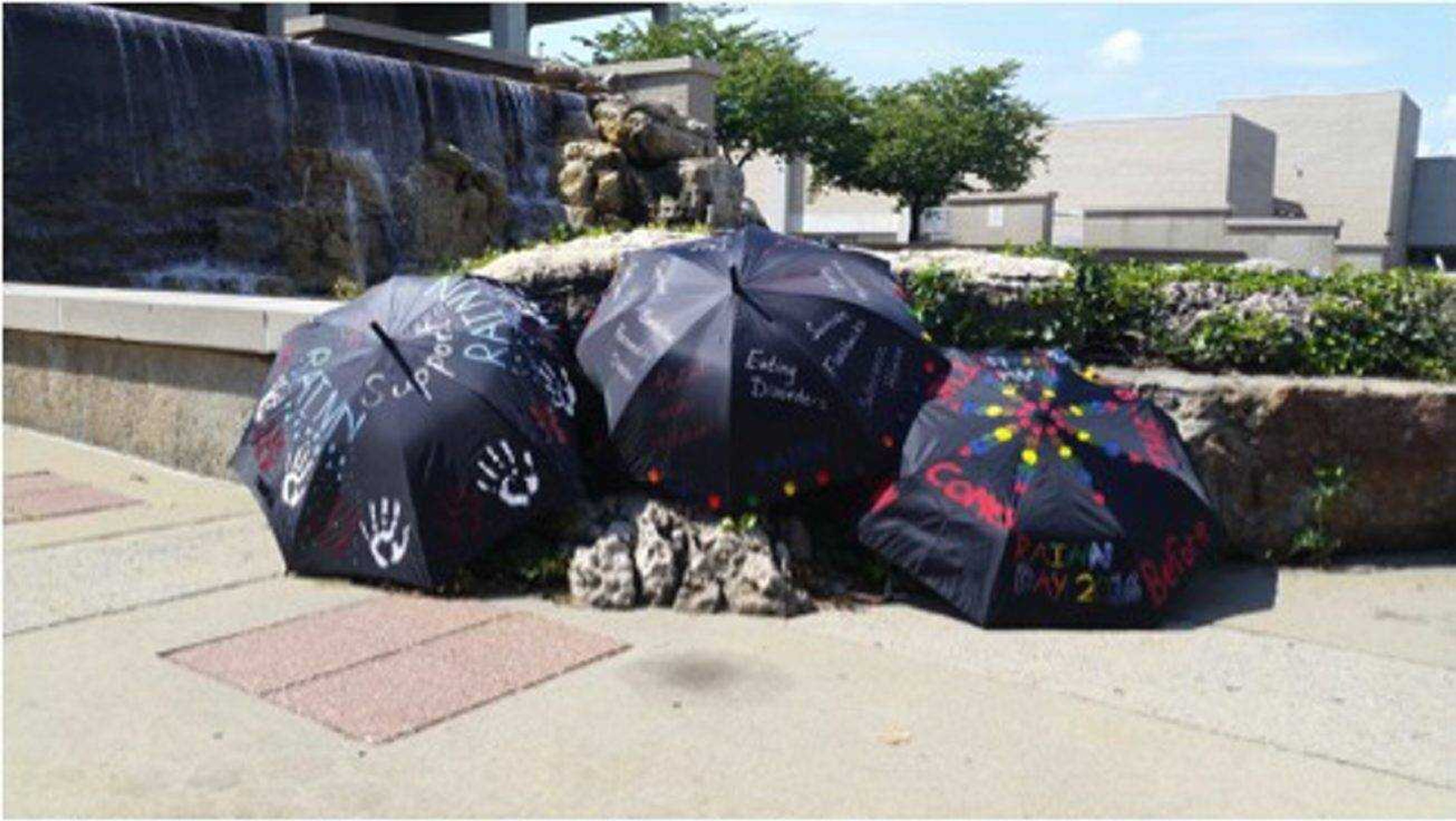Southeast Missouri State University's Campus Violence Prevention Program recognized RAINN Day, Sept. 12 through 15, in front of Kent Library to raise awareness about interpersonal abuse and sexual violence. RAINN is the Rape, Abuse, and Incest National Network and observed on the third Thursday of September.
Donna St. Sauver, coordinator of the Campus Violence Prevention Program, said RAINN is the largest network for survivors of sexual assault. The CVPP held an annual umbrella campaign the week leading up to RAINN Day to bring awareness and education to students regarding sexual violence, risk reduction and survivor support services.
"The umbrella idea attracts a lot of attention," St. Sauver said.
Umbrellas are decorated by students and are used as an engaging educational tool that teaches about the statistics of sexual violence, the emotional, physical and mental pain of sexual assault and how to support survivors. RAINN Day and the umbrellas help to get people talking about sexual violence.
"A big part of prevention is not being afraid to talk about it," St. Sauver said.
There are three kinds of prevention that chart a range of intervention available to CVPP: primary, secondary and tertiary prevention. That range includes everything from responding to the crisis when it happens all the way to finding the source of the problem. St. Sauver likes to call it "looking up the river."
"I can counsel and give crisis advocacy to clients all day long," St. Sauver said. "But if I never look up the river and see why so many people are drowning, I'll never make any headway in minimizing the problem. So the education is key to prevention."
The conversation of sexual assault education and prevention is delivered in the classroom through weekly presentations by CVPP. Presentations are done mostly in the UI 100 classes because the organization wants to target students as soon as possible once they're on campus. St. Sauver said CVPP needs to be careful not to present sexual violence education, prevention and risk reduction in a victim blaming way.
"The bottom line is, rapists have to stop raping," St. Sauver said. "So if you put too much emphasis on the buddy system, not walking after dark, not having too much to drink, it comes across as victim blaming."
St. Sauver said society stigmatizes sexual assault survivors.
"There's this social stigma that if you've experienced violence, you're broken, you're not as good as a person who hasn't experienced violence," St. Sauver said.
Southeast junior Mahala Landeros is a sexual assault survivor and for a period of time, blamed herself for being raped at a party last semester by a friend she had known for two years.
"I went through, I guess, you know the cliche denial thing," Landeros said. "I was like, well no, we had both been drinking, so it was my fault for going to a party. I don't party. I had never been to parties in high school, I'd never been to parties in college. But I went to a party. I shouldn't have done that."
She said she went through that stage for weeks.
"It was tormenting because I thought it was my fault," Landeros said. "I have had sex before. I never woke up feeling like this. I never went weeks after having done this type of activity crying and beating myself up about it or anything."
Landeros looked for ways to justify the rape and believed it would be easier to accept a one-night stand rather than a rape. She said she trusted the friend who raped her, which caused a period of confusion for her.
"Looking back now, I see exactly what he was doing," Landeros said. "I can pinpoint every single move he was making that was leading up to him raping me. But in the moment, no, you're just hanging out with a friend."
The healing process for survivors begins with a platform to share their story, and that's one of the reasons CVPP brings the national RAINN Day event to campus.
"We're telling survivors that they are supported and that it's OK to talk about it," St. Sauver said. "And then we're educating. We're educating the prevalence of violence."
RAINN Day gives students something to do, to have a voice and to take a stand against sexual violence.
"It's something that they can do and in the process of decorating the umbrella, they look up statistics and then they are talking about it," St. Sauver said. "Then in talking about it, a survivor might hear and might come forward or feel more at ease in the group because their group has supported them."
For those who have experienced sexual violence and have not yet spoken about it, Landeros said she would like them to tell someone.
"My words to them would be tell, because I almost promise that their perpetrator wanted them to be silent," Landeros said. "They're not in that night anymore or that day. That's not happening. They're not being controlled anymore. Break the silence."
For the full story, visit SoutheastArrow.com.






